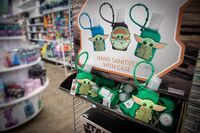(Source Bloomberg)
Some widely available hand sanitizers that American consumers snapped up last year to ward off coronavirus infection contain high levels of a chemical known to cause cancer, a testing firm’s analysis found.
An assortment of hand cleaners that flooded into the market after mainstays disappeared from retail outlets contain high levels of benzene, according to Valisure, a New Haven, Connecticut-based online pharmacy that tests products for quality and consistency.
Benzene causes cancer, according to the U.S. Department of Health and Human Services. The World Health Organization’s cancer research arm puts it in the highest risk category, on par with asbestos.
Valisure analyzed 260 bottles from 168 brands and found 17% of the samples contained detectable levels of benzene. Twenty-one bottles, or 8%, contained benzene above two parts per million, a temporary limit the FDA set for liquid hand sanitizers to ease the supply squeeze.
That level “can be tolerated for a relatively short period of time,” the FDA said in June. Fifteen brands were represented among the 21 bottles with the highest levels of contamination. The samples came from the shelves of stores nearby its headquarters and online outlets, Valisure said.
To see Valisure’s citizen petition to the FDA, including a list of brands identified with high benzene levels, click here.

Exhorted by politicians and health officials to wash their hands, consumers quickly exhausted supplies of household names such as Purell and Suave. While those brands, like most of those tested, didn’t contain unsafe benzene levels, many new entrants did, according to Valisure. Some of these tainted sanitizers were found for sale at Amazon.com Inc. and Target Corp. outlets.
Most hand sanitizers Valisure found and tested were gels. The pharmacy’s test results were verified by Yale University’s Chemical and Biophysical Instrumentation Center and Boston Analytical, a private lab. On Wednesday, Valisure asked the Food and Drug Administration to take action on the contaminated products.
Hand sanitizer brands with bottles testing for the highest levels of benzene detected by Valisure
| 1. artnaturals | 9. beauty concepts |
| 2. Scentsational Soaps & Candles Inc. | 10. PureLogic |
| 3. huangjisoo | 11. Miami Carry On |
| 4. TrueWash | 12. Natural Wunderz |
| 5. The Creme Shop | 13. clean-protect-sanitize |
| 6. Star Wars Mandalorian | 14. Puretize |
| 7. Body Prescriptions | 15. Hand Clean 100 |
| 8. Born Basic |
Blood Cancers
“These findings are alarming and reveal a serious potential risk to public health,” Valisure said in a petition signed by Chief Executive Officer David Light and other executives. The pharmacy previously found high levels of other carcinogens in drug components manufactured overseas for the U.S. market.
Read More: America’s Love Affair With Cheap Drugs Has a Hidden Cost
It isn’t clear how benzene became present in the products. It may have been introduced during the manufacturing process when germ-killing alcohol is purified, Valisure said.
Among the most contaminated hand cleaners were products from artnaturals, Scentsational Soaps and Candles Inc., The Creme Shop and a Baby Yoda-themed bottle from Best Brands Consumer Products Inc. Each started selling the cleaners that were tested by Valisure in either April or May of 2020, according to FDA records. An artnaturals sanitizer contained the most benzene of those sampled, at 16 parts per million.
Calls and emails to the manufacturers and retailers requesting comment weren’t returned. Walt Disney Co., which airs “The Mandalorian” series in which the Baby Yoda character appears, didn’t immediately respond to a request for comment.

Better Brands Baby Yoda hand sanitizer Photographer:
Tiffany Hagler-Geard/Bloomberg
Benzene has been linked to certain blood cancers, such as leukemias. Cigarette smoke accounts for about half of the benzene exposure in the U.S., according to the American Cancer Society. Workers in certain chemical industries risk exposure to the material, which is used to make plastics and rubber.
Skin Absorption
The National Institute for Occupational Safety and Health says skin absorption and ingestion are also possible. In 1990, a local environmental official in North Carolina discovered benzene in bottles of Perrier water that led the company to conduct a massive recall and halt distribution to 120 countries. The company resumed bottling soon after the problem was identified and solved, and was bought by Nestle SA in 1992.
Government watchdog Public Citizen helped lead an effort in the 1970s and 1980s to protect U.S. workers against benzene exposure.
Read more at: https://www.bloombergquint.com/business/carcinogen-found-in-hand-sanitizers-that-plugged-pandemic-gap
Copyright © BloombergQuint
